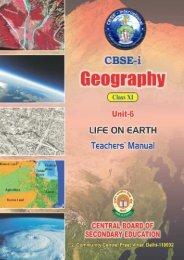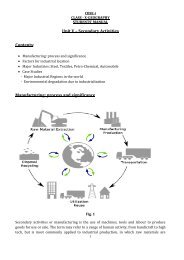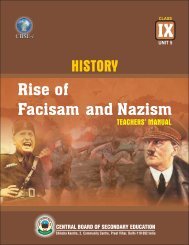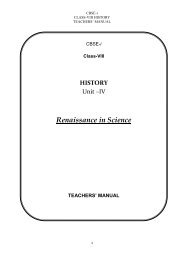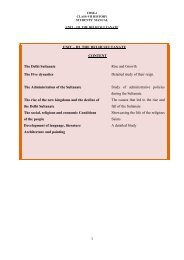Unit - 3 Tenses - CBSE International
Unit - 3 Tenses - CBSE International
Unit - 3 Tenses - CBSE International
Create successful ePaper yourself
Turn your PDF publications into a flip-book with our unique Google optimized e-Paper software.
The lesson plan on transitive and intransitive verb is activity based enabling a studentto understand that transitive verb requires an object and linking verbs are alwaysintransitive.General Objectives:To equip students with an ability to use English in their everyday lifeTo teach new structures and wordsTo enable students to understand what they hear on a variety of topicsTo enable students to speak good EnglishTo teach the basic tenses of present, past and futureTo develop in a learner the ability to read, write and enjoy English withoutdepending on the teacher for explanation and translationTo provide the students with a store of basic structures and vocabulary inorder to enable them to write simple guided paragraphsSpecific Objectives:To manage changes of tense in a given sentenceTo conjugate with confidenceTo understand the present perfect formTo differentiate between present continuous and perfect tenseTo use the present and past perfect tenses correctly while writingTo recognize and use future tense in English languageTo answer questions and generate simple essays using the future tenseTo classify passages written in the future tenseTo identify present continuous and perfect forms in a sentence2
Topic: (A) Simple Present, Present Continuous and Present Perfect TenseDuration: 3 Hours, 30 MinutesSkills Activity MultipleIntelligencesIncorporatedListeningSpeakingReadingWritingLook at the flash cards with pictures of basic verbmovements like – eating, smelling, turning, crawling, etc.Speak out the action in a word or frame a sentence inpresent continuous tense.Narrate the experiences: Show and narrate an incidentfrom newspaper. Ask questions related to the incidentusing present perfect tense using „For‟ and „Since‟.The Miming GamePlay a game of „pictionary‟ by framing teams anddrawing the action of an animal on the board and havetheir classmates guess the phrase.Guess My ActionLook at the picture and speculate the action.AlliterationsStudents try to write a poem describing animal actionsusing alliterations.Guess My ActionLook at pictures and try to speculate the actionperformed in the picture.Spatial andNaturalisticSpatial,Naturalistic,andInterpersonalLinguistic,Spatial andIntrapersonalSpatial,IntrapersonalLearning Outcomes:By the end of the lesson the students will be able to:identify the present continuous tenseuse it in their own sentences to describe actionsgain an understanding abilities of animals and environments they live inuse alliterations to write a poemcomprehend present perfect effectivelyidentify and differentiate between simple present and present perfect tense3
Topic: (B) Future TenseDuration: 3 Hours 30 MinutesSkills Activity MultipleIntelligencesIncorporatedListeningSpeakingReadingWritingBingoPlay „Bingo‟ with a list of actions which happens in amovie.Predictions with present evidence:Watch the film „Gulliver‟s Travels‟ and predict the nextscene. (Bingo)Talking about the futureProvide students a list of future events, each of whichcould be an arrangement, a plan or a thing that theycan predict (e.g., birthday party, retirement, exerciseand window shopping).Watching a video and using ‘Will’ for predictionsChoose any film where one character experiences ahuge change in his/her life, e.g., Changing Places. Justbefore the change happens, get students to guess whatthe consequences of those changes will be, e.g., "Hewill be happier".Was going toWatch a film and frame sentences using "was going to"to predict about the future action of various characters.IntrapersonalIntrapersonalandInterpersonalSpatial andIntrapersonalVisual-Spatial andIntrapersonalLearning Outcomes:By the end of the lesson students will be able to:identify the tense of verbs in the sentences and paragraphs;learn future forms and their uses;use the future tense correctly to communicate effectively;identify past, present, and future tense verbs and correct inconsistent verb tenses.4
Topic: (C) Transitive and Intransitive VerbsDuration: 2 HoursSkills Activity MultipleIntelligenceIncorporatedListeningSpeakingReadingWritingMe and My PetIn group of four discuss about pets. One says thesentence and other guesses the verb and stateswhether transitive or intransitive.Guess the VerbIn pair, share jokes and identify verbs transitive andIntransitive.Read It AloudTeacher reads out the story.„Lion King‟ by Don Ferguson. Pause on each verb.Students identify the verb and show flash cards fortransitive and intransitive verbs. Teacher writes themon the board.Write 5 sentences using as many verbs as possibleabout a pet or any other favourite animal. Make twocolumns and write the verbs under Transitive orIntransitive heading.Spatial andIntrapersonalSpatial andIntrapersonalIntrapersonalInterpersonalLearning Outcomes:By the end of the lesson the students will be able to:identify the verbs as transitive and intransitive.use the verb forms in relation with the given subjects. (First, Second and Thirdperson.)5
Topic : (D) Book ReviewDuration : 3 HoursSkills Activity MultipleIntelligencesIncorporatedListeningSpeakingReadingWritingTeacher will narrate a part of the book andencourage the students to read the entire book andprepare a summary of it.In pairs, students will interview their partners whopretend to be a character from the book.While reading the book, the students will discuss therelevance of the title and create a glossary ofunfamiliar words from the book.List ten things that they learnt from the book.Design a timeline of the events in the book.Linguistic,Spatial andIntrapersonalLinguistic,Spatial andIntrapersonalLinguistic,Spatial andIntrapersonalLinguistic,Visual-SpatialandIntrapersonalLearning Outcomes:The students will be able to:comprehend a book and prepare a summary;identify the important characters and describe them;broaden one‟s understanding of the world and the society;learn to summarize, compare and contrast, make predictions and connections ofdifferent perspectives.Materials Required:Flash cards with animals performing certain actions, newspaper clippings, pictures,timeline charts, flash cards, blackboard, marker, flashcards, video CD, CD player,6
worksheet, prepare some flash cards with pictures of robbery (these can be hand-drawnor downloaded), a set of questions, a blackboard, different cards to revise the past tenseforms.Transdisciplinary ActivitiesSubjectGeneralKnowledgeGeneral ScienceActivityGuess what they have doneStudents look at the newspaper clippings and try to identifypeople.In groups, compose a creative short story about an animal‟s lifeduring one of the four seasons of the year. Stories to include adescription of environment, climate and diet.Critical Thinking:Sentence sequencing:Give students groups of nouns, adjectives, helping verbs, present and past tense verbs.Ask them to put the words that make sense together in a sentence. The words can alsobe manipulated to change the tense or the time period of a sentence.Life Skills/SEWA:Students to research about animals which are extinct or their numbers are very less inthe wild they lived in the past. Write a paragraph each on at least 3 such animals.7
LESSON PLAN - ATopic : <strong>Tenses</strong> - Present Continuous Tense and Present Perfect TenseDuration : 3 Hours 30 MinutesBrief Description:The lesson plan teaches present continuous and introduce the present perfect tense inthe active voice and also about animals to students. Typically, this lesson will work bestwith students due to the extensive use of miming and acting.Learning Objectives:To ensure the understanding of the present continuous structure while getting thechildren to act out certain actions in the classroom.To gain an understanding of abilities of animals and environments they live in.To know about present continuous form. Its usage to describe what is happeningnow or about this time now. It is formed by the verb to be: am/is/are + presentparticiple (verb + -ing)To comprehend and use the Present Perfect effectively.To identify the difference between simple present, present perfect and presentcontinuous tense.Materials Required:Flash cards with animals performing certain actions. These can be hand-drawn ordownloaded Blackboard, newspaper clippings, pictures, timeline charts, flash cards.TEACHER ACTIVITYBrainstorming Session:First, engage the students‟ attention by brainstorming about different animals.Elicit responses for animals from all over the world and also animals around us.Then work on basic verbs of movement. These should include but not limited to8
eating, smelling, jumping, turning, crawling, wearing, barking, thinking, using,flying, playing, sucking, splashing, and holding.Next display some flashcards of animals doing certain actions. For example; „thebird is flying, „The monkey is eating‟, „The shark is swimming‟. If possible show aclip of animals on TV. Just mute the sound and let the students tell you what theysee.Narrating Experiences:The teacher asks various questions related to different situations using the PresentPerfect Tense.The questions are written on the board and children read them aloud and ask eachother and finally answer them.The students are asked about different situations like:Cinema Experiences:Have you ever met a movie star? Have you cried in a cinema? Have you left the cinemabefore the movie ended? etc.Computer Experiences:Have you ever been in a video conference? Have you ever had a computer virus? Haveyou ever used an Internet chat? etc.Health Experiences:Have you ever spent a night in a hospital? Have you ever broken a bone? Have youever had an operation? etc.School Experiences:An outing that you remember till dayThese can be done by students in pairs, or organised into a larger survey with studentshaving different questions and reporting back their findings. In either case students can9
e encouraged to ask follow up questions (when, who, with…) which will prompt toswitch from present perfect to simple past.The teacher calls individual students to ask questions to elicit answers from the otherstudents.Provide feedback where it is needed. Feedback should be given to the students for selfcorrection,peer correction and then teacher correction.The teacher writes a few sentences on the board to help them:For example:I think he/she has just delivered a speech.As students call out suggestions, ask why. Who can guess the new story?When teaching the present perfect, or explaining the present perfect, it is often easiest tofocus on the use of the present perfect than the meaning. This is especially true for thefirst time students encounter it (usually associated with the use of talking aboutexperiences).STUDENT ACTIVITYStudents try to write a poem describing animal actions using alliterations. Observe andmonitor the students as they complete the sheet.Miming Game:Finally, engage the students by playing a miming game. Students to come to the front ofthe classroom and choose a piece of paper with a phrase written on it like "The horse isrunning". Act out the action and have the rest of the students guess what the phrase is.Pictionary:Play a game of "pictionary" where the teams have to draw the action/animal depictinga phrase on the board and have their classmates guess the sentence.10
Guess My Action:Look at clippings from the old newspapers and magazines of people doing thingsor visibly showing emotions.The students look at the picture and try to speculate as to what the person hasdone.Review:Review the students while speaking a complete sentence and their use of proper tensefor this activity.Assessment Guidelines:Students to be given worksheet 4, 5 and 8.11
LESSON PLAN - BTopic: <strong>Tenses</strong> ( Future Tense: Going To)Duration: 3 Hours 30 MinutesBrief Description:The range of verb forms used in English to talk about the future is one of the mostdifficult parts of the language. Misconceptions like “Present Continuous is for the nearfuture” are common. This lesson plan will teach students how to present the mostcommon future tenses in the easiest to understand and most generalized way.Learning Objectives:To identify the tense of verbs in the sentences and paragraphs.To learn future forms and their uses.To use the future tense correctly to communicate effectively.To identify past, present and future tense verbs and correct inconsistent verbtenses.Materials Required:Blackboard, Marker, Flashcards, Video CD, CD Player, Worksheets.TEACHER ACTIVITY1. Talking about the future:Provide students with a list of future events, each of which could be anarrangement, a plan or just a thing that they can predict (e.g., birthday party,retirement, exercise and window shopping). A student picks one and guesseswhether their partner already has an arrangement or a plan, or can only make aprediction. After their partner has confirmed which one it is, they then try to makea sentence in the right tense, e.g., “You are having a birthday party thisweekend”(arrangement), “You aren‟t going to bother with a birthday party this12
year” (plan) or “Your family will probably arrange a surprise party for you”(prediction).2. Watching a video and using ‘Will’ for predictions:Watch the film „Gulliver‟s Travels‟ and predict the next scene or, choose any filmwhere a character from the movie experiences a huge change in his/her life, e.g.Changing Places. Just before the change happens, get students to guess what theconsequences of those changes will be, e.g. "He will be happier with less money".STUDENT ACTIVITY1. Bingo:Hand over a list of actions, some of which do happen in the film „Ice Age‟ tothe students. Play a bingo game with the list of actions.The student with maximum points wins the game. The students will predictabout a future action during the course of the movie. They also frame asentence.Make a list of „Will‟ statements about the film, e.g. "There will be a car chase",and they pick the ones that they think are true and watch and check and sayBingo.Predict ideas, e.g. for sequels, to each other with sentences like "It will starJohn Travolta as the President".Predict how the film will turn out.2. ‘Going to’ for predictions with present evidence:Pause the film when something is about to happen, e.g. someone tottering on theedge of a cliff, and let the students predict the next scene.Review:Students write a passage on the activities they plan to do during their holiday.Assessment:Students to be given worksheets 9 and 1013
LESSON PLAN - CTopic: Transitive and Intransitive VerbsDuration: 2 HoursBrief Description:This lesson plan teaches about transitive and intransitive verbs with direct object andverb forms with subjects in first, second and third person.Learning Objectives:To learn about transitive and intransitive verbs.To become familiar with the rules that govern the use of verbs in sentences.To develop basic skills in the use of verbs in sentences.To learn about verb forms with subjects in first, second and third person.Materials Required:Story book – „Lion King‟ by Don Ferguson, A4 size sheets, flash cards.TEACHER ACTIVITYListening Activity:Engage students by discussing about pets.Write a few subjects related to pets on the board. Ask students to makemeaningful sentences using the given subjects, thereby familiarizing the studentswith the concept of subject, verb and object in a sentence.Reading Activity:Read the story „Lion King‟ to the students and ask them to recall a few sentencesfrom the story. Write those sentences on the board, underlining the verbs. Askstudents to identify the subject and the object in the written sentences.14
Let the students find out whether the action is transmitted to the object or notthereby explaining the concept of Transitive and Intransitive verbs to thestudents.Writing Activity:Ask students to write 5 sentences using as many verbs as possible about a pet or anyfavourite animal and then bifurcate them as Transitive or Intransitive.Speaking Activity:Involve students share jokes and identify verbs as Transitive and Intransitive.Review:Students will be reviewed on the basis of their writing skills as they identify theTransitive and Intransitive in the given situations.Assessment:Students to be given worksheets.15
Topic: Book ReviewLESSON PLAN - DDuration: 3 HoursBrief Description:This lesson plan enables the students to summarize the content of the book, identify itsmain arguments and establish a degree of success with which the author supports his orher claims.Learning Objectives:To enable a student to comprehend a book.To express his or her thought and form an opinion about the book.To enable a student to develop critical reading skills.Materials Required:„Lion King‟ by Don FergusonAny favourite book on animalsTEACHER ACTIVITYNarrate a part of the book and encourage the students to read the entire book.Involve students to create a glossary of unfamiliar words from the book anddiscuss the relevance of the title.Ask students to list ten things that they learnt from the book.STUDENT ACTIVITYIn pairs, students will interview their partners who pretend to be a characterfrom the book.Students will design a time line for events in the book.16
In groups, students will rewrite the story in form of a play and enact it.Review:Students will be reviewed on the basis of their enactment of the play as written bythem.Assessment:Write a book review of your favourite book on animals.Describe the favourite character from the book read.Assessment RubricsExpectedLearningOutcomesIndicators of Student’s PerformanceBeginning Developing Achieved ExemplaryTopicThe student isThe student isThe student isThe student isable to:able to:able to:able to:SimpleIdentify theSometimesIdentify theIdentify thePresent andpresentidentify thepresentpresentPresentContinuousTensecontinuoustense withassistance andpresentcontinuoustense and use itcontinuoustense very welland use it incontinuous tenseremarkably anduse it effectivelyuse it inin sentences.sentences.in sentences.sentences.Past TenseUnderstand theUnderstand theUnderstand theUnderstand andpast form ofpast form ofpast form ofcorrectly usageverbs.verbs and use itverbs and canof the past formin sentences butuse it inof verbs inmakes mistakes.sentences.sentences.17
PresentUse PresentUse PresentUse PresentUse PresentPerfectPerfect tensePerfect tense inPerfect tensePerfect tenseTenseonly sometimessentences buteffectively andvery effectivelybut needs helpstill needs helpidentifies theand confidentlyin identifyingin identifyingdifferenceand identifiesthe differencethe differencebetweenthe differencebetween Simplebetween SimpleSimple Pastbetween SimplePast tense andPast tense andtense andPast tense andPresent PerfectPresent PerfectPresent PerfectPresent Perfecttense.tense.tense with ease.tense with ease.FutureUse FutureUse FutureUse FutureUse FutureTensetense only withtense sometimestense correctlytense correctlyassistance whilecorrectly andandand properlycommunicating.communicatecommunicatesresulting ineffectively.effectively.effectivecommunication.18
TEACHER’S RESOURCE MATERIALMaterials Required:Flash cards with animals performing certain actions, newspaper clippings, pictures,timeline charts, blackboard, marker, video CD, CD player, worksheet, prepare someflash cards with pictures of robbery (these can be hand-drawn or downloaded), a set ofquestions, different cards to revise the past tense forms.Book:„Lion King‟ by Don FergusonAudio- Video:Website For Reference:General:1. http://www.breakingnewsenglish.com/.2. http://www.usingenglish.com/handouts/3. http://bogglesworldesl.com4. http://www.eslflow.com/Fillers.htmlGrammar:1. http://www.eslcafe.com/grammar/confusing_words_come_go.htmlhttp://englishforyounglearners.org/funny/2. http://www.eslflashcards.com/3. http://abcteach.com/directory/languages/eslenglish_as_second_language/esl_grammar/Vocabulary:1. http://www.eslall.com/exercises_66_l0.html2. http://www.saksena.net/partygames/bingo/3. http://www.learnersdictionary.com/19
Five Forms of Verb <strong>Tenses</strong> (using the Present Progressive/Present Continuous, forexample)Here are the five forms students of English need to learn for every verb tense.1. Affirmative Usage (e.g., She is eating dinner.)2. Negative Usage (e.g., She is not eating dinner.)3. Yes/No Questions (e.g., Is she eating dinner?)4. Short Answers (e.g., Yes, she is. No, she isn't.)5. WH- Questions (e.g., Where is she eating dinner?)Of course, in addition to the five forms, you should teach the conjugation of the verb(based on the subject pronouns I, you, he/she/it, they, and we). Here's an example ofthe verb "dance" conjugated in the Present Progressive.I am dancing in the street.You are dancing in the street.He/She/It is dancing in the street.They are dancing in the street.We are dancing in the street.Yippee!Function(s) of the Verb <strong>Tenses</strong>The next important thing to teach English learners is the "function" of a particular verbtense. Knowing the function(s) of a tense helps the students determine which is thecorrect verb tense to use.Let's continue to use the Present Progressive for our example.The main function of the Present Progressive is to describe something that is in processat this very moment (e.g., Right now, I am writing about ESL verb tenses and verb tenselesson plans. You are reading this page.).20
We also use the Present Progressive (or Present Continuous) to talk about things thatare happening "these days" or at this time in our lives or in history. For example:Q: So, what are you doing these days?A: I am teaching primary students.And the last function (an often ignored function of the Present Continuous, butvery commonly used by native English speakers) is to talk about future plans. Forexample:Q: What are you doing tonight?A: I'm cooking dinner for some friends.Easier Present Progressive has been picked to illustrate what must be taught foreach of the verb tenses. It becomes a little more complicated to teach the functionsfor something like the Present Perfect, but the basics are still the same. For eachverb tense, verb tense lesson plans should include the following:1. Conjugation2. Forms3. Function(s)Here's the verb tense list of basic grammar tenses, including all possible names of thetenses.1. Simple Present or Present Simplee.g., I play, you play, she/he/it plays, we play, they play2. Present Progressive or Present Continuous, Simple Present Progressive orSimple Present Continuouse.g., I am playing, you are playing, she/he/it is playing, we are playing, they areplaying21
3. Simple Past or Past Simplee.g., I played, you played, he/she/it played, we played, they played4. Past Progressive or Past Continuous, Simple Past Progressive or Simple PastContinuouse.g., I was playing, you were playing, she/he/it was playing, we were playing,they were playing.5. Present Perfect or Simple Present Perfecte.g., I have played, you have played, he/she/it has played, we have played, theyhave played6. Present Perfect Progressive or Present Perfect Continuouse.g., I have been playing, you have been playing, he/she/it has been playing, wehave been playing, they have been playing7. Past Perfect or Simple Past Perfecte.g., I had played, you had played, he/she/it had played, we had played, they hadplayed8. Past Perfect Progressive or Past Perfect Continuouse.g., I had been playing, you had been playing, he/she/it had been playing, wehad been playing, they had been playing9. Simple Future or Future Simplee.g., I will play, you will play, he/she/it will play, they will play, we will play or Iam going to play, you are going to play, he/she/it is going to play, we are going toplay, they are going to play10. Future Progressive or Future Continuous, Simple Future Progressive or SimpleFuture Continuouse.g., I will be playing, you will be playing, he/she/it will be playing, they will beplaying, we will be playing22
11. Future Perfect or Simple Future Perfecte.g., I will have played, you will have played, he/she/it will have played, they willhave played, we will have played12. Future Perfect Progressive or Future Perfect Continuouse.g., I will have been playing, you will have been playing, he/she/it will have beenplaying, they will have been playing, we will have been playing23
WORKSHEET NO. 1Simple and Present Continuous TenseUse the verbs in the box in either Simple Present or Present Continuous Tense.enjoy laugh talk get lookmake spend hate tend wear1. When children become teenagers, they ____________ more time with theirfriends.2. Rick admires those girls who ________________ red dresses .3. I agree that Jane is a good person to be with, but she ____________ to beaggressive now and again.4. Mary ____________ going to parties and she herself often gives one as well.5. The kids _____________ along well each other now, but they may start toquarrel anytime.6. Susan ____________ waiting, so don't keep her waiting no matter what thereason is.7. What I really like about Mellisa is that she ________ amazing cakes.8. Tracy has just been to the hairdresser's, but her hair ___________ as if ithasn't been done.9. I don't know what or who she __________ at. I don't think there is anythingfunny.10. Rita ___________ a _____________ with friends.24
WORKSHEET NO. 2Present Continuous TenseAnimal AlliterationAlliteration is when all the words start with the same sound.Big bears biting berriesYou try some:Dirty dogs _____________ in the dirt.______________ cats cooking carrots.Five fish ________________________________________ snakes slithering.Red rabbits _____________________.______________ horses hauling hay.Purple pandas ___________ pictures.Creepy _________________ crawling.Many mice ______________________.Tired ____________________ talking.Green gorillas ___________________.25
WORKSHEET NO. 3Present Continuous TenseComplete the sentences with the correct forms of the verbs in brackets. Use theSimple Present or the Present Continuous Tense.1 My brother __________________________ (like) this CD very much.2 He __________________________ (travel) to China this summer.3 We __________________ (go) to have lunch now. Would you like to join us?4 We always __________________________ (visit) Grandma on Sundays.5 In this photo, we ________________________ (play) volleyball on the beach.6 I __________________________ (play) tennis every day.7 My father can‟t come to the phone now. He ______________ (take) a shower.8 My father ____________________ (work) as an accountant in a big company.9 I think this pen __________________________ (cost) HK$8.10 I can‟t play online games now. My brother _________________________(use) the computer to do his homework.26
WORKSHEET NO. 4Present Continuous TenseDescribe using the pictures and hints what the animals are doing. Use the PresentContinuous Tense.For eg: The owl is teaching.______________________________________________________________________________________________________________________________________________________________________________________________________________________________________________________________________________________________________________________________________________________________________________________________________________________________________________________________________________27
WORKSHEET NO. 5Present Continuous TenseLook at the pictures and write what the animals are doing:1. __________________________________________________________2. ___________________________________________________________3. __________________________________________________________4. __________________________________________________________5. ___________________________________________________________28
WORKSHEET NO. 6Past TenseWrite the past tense next to each of the verbs below. Then, find the past tense of theverb in the grid below.begin get sayblow give seebring go sendbuy grow singcatch hear sitcome know sleepdo make swimdraw meet takedrink read throweat run write29
WORKSHEET NO. 7Past TenseIrregular Past Tense Verbs ClozeFill in the blanks below with one of the 15 irregular past tense verbs in the box.bitfoundleftquitspentchoseheldmeantsoldtoldfeltkeptpaidshutwore(1) Lucky me! I _________________ some money on the ground.(2) He _________________ his comic book collection to a friend for $20.00.(3) I was cold so I _________________ the window.(4) There were many colors, but I _________________ a blue one.(5) It was a windy day so I _________________ a warm coat.(6) He _________________ the baby very gently in his arms.(7) She _________________ $50 on new shoes and_________________ $30 for her pants.(8) I _________________ my bag at school so I have to go back and get it.(9) I didn't enjoy playing baseball so I _________________ the team.(10) He _________________ asking same question again and again.(11) I _________________ what I said.(12) He _________________ the truth.30
WORKSHEET NO. 8Present Perfect TenseA. Complete the sentences using present perfect.1. I ……………………… to France with my sister. (go)2. They ……………………. interested in English for 5 years. (be)3. He …………….. a book and it …………….. very popular. (write) (become)4. He ………………………. something to Andrea. (tell)5. How long ………………….. you …………………. interested in Maths? (be)B. Make sentences using the prompts below as in the example.1. read/ a newspaper/ yesterdayI haven‟t read a newspaper since yesterday.2. have/ a break/ this morning3. travel/ abroad/ last summer4. watch/ TV/ las night5. buy/ a present/ DecemberC. Fill in with for or since.1. ……………… ten years.2. ……………… I was five.3. ……………… 8 O‟clock.4. ……………… two hours.5. ……………… ages.6. ……………… Saturday.31
D. Correct the mistakes.1. We have bought a sofa last month.2. Jim lives in Germany for 3 years.3. My father has went fishing.4. She is just moved house.5. We have eaten lunch at one o‟clock.6. Sophie has do her homework.32
WORKSHEET NO. 9Future TenseTime Travel DiscussionDo you think time travel is possible?Would you prefer to travel to the past or the future?If you could travel to any time period in the past where and when would youtravel?If you could travel back in time and change something that happened in theworld would you?If you could know what was going to happen to you, would you want to know?_____________________________________________________________________________________________________________________________________________________________________________________________________________________________________________________________________________________________Will-Going to1. A: Have you decided what to do in the summer?B: Yes, I have. I ____________ have a nice holiday by the sea.33
A: I hope you _____________ enjoy.2. A: The computer printer isn‟t working again. What am I going to do?B: Calm down. Give Tom a call. He ____________________ fix it for you. It isprobably just a loose connection.3. A: Are you going to the post office soon?B: Yes, Why?A: I need to send this letter today.B: I ________________ mail it for you.A: Thanks.4. I‟m not going away for the weekend. I‟m staying at home. I ____________ startbuilding my garage. The bricks have come at last.5. A: I‟m going to the centre of town tomorrow. I ____________ buy some newclothes.B: Oh, what __________ you get for me.34
WORKSHEET NO. 10Future Tense1. What are the future and past tense forms of these verbs:Fall, have, meet, travel, visit, see, do, bring, help, find35
2. Check the meaning of these words then read your horoscope.Perhaps because loseHealth angry adviceFast easy troublesHappiness luck patientWonder trust till3. Answer the following questions:i. Will you be lucky this year? Why?ii.iii.iv.Will you have a good time this year? Why? Why not?Will there be any problems?Will you meet anyone interesting? Who do you think it will be?36
WORKSHEET NO. 11Transitive and Intransitive VerbsIn each of the following sentences, choose whether the bolded verb is transitive orintransitive.1. We are playing the violin.a. transitiveb. intransitive2. The children are playing in the street.a. transitiveb. intransitive3. He is writing his parents a letter.a. transitiveb. intransitive4. They aren't reading, they are writing.a. transitiveb. intransitive5. I am sleeping.a. transitiveb. intransitive6. You are flying to Paris.a. transitiveb. intransitive37
7. He is picking a card for his mother.a. transitiveb. intransitive8. The students are answering the questions.a. transitiveb. intransitive38
WORKSHEET NO. 12Transitive and Intransitive VerbsName the verbs in the following sentences and state whether they are usedtransitively or intransitively.1. Some ants fight fiercely. ____________________________________2. The explosion sank the ship. ____________________________________3. He spoke the truth. ____________________________________4. He spoke loudly. ____________________________________5. Boil the water. ____________________________________6. The motorman stopped the train. ____________________________________7. The horse kicked the boy. ____________________________________8. The sun rises in the morning. ____________________________________9. The watchman blew his whistle. ____________________________________10. The poor widow killed herself. ____________________________________39
CENTRAL BOARD OF SECONDARY EDUCATIONShiksha Kendra, 2, Community Centre, Preet Vihar, Delhi-110 092 India



